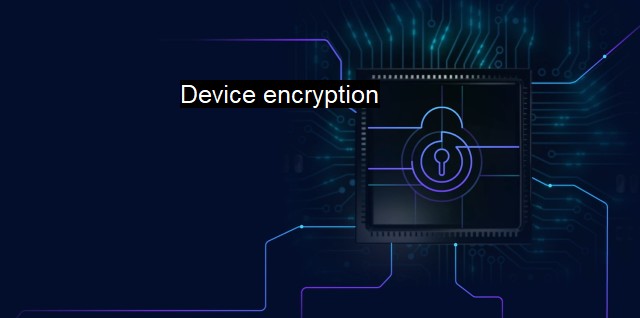What is Device encryption?
Importance of Data Encryption for Keeping your Confidential Data Safe in the Modern World
Device encryption is a key aspect in the field of cybersecurity and antivirus protection. It is a process that involves converting readable data into a form of scrambled, 'unreadable' information that can only be deciphered using an encryption key. In simple terms, encryption is a process that alters legible content into a cipher text in order to prevent unauthorized access.Device encryption often functions at the hardware level. It offers a security solution that protects information located on hardware from various forms of data breaches. Traditional password-protection methods rely on operating systems to guard data, however these conventional protective measures can be exploited by malicious elements such as hackers, malware, spyware, viruses, and worms. This vulnerability highlights the crucial role of device encryption in the realm of cybersecurity.
Device encryption encodes all user and system files, rendering them unintelligible to unauthorized individuals. Even if the device is compromised, the encrypted data remains secure as it can only be accessed through authorized decryption. Such encryption utilizes complex mathematical functions known as cryptographic key algorithms. The larger the key, signified through bits - 256-bit encryption or 512-bit encryption, for instance - the more secure the encrypted data because there are more potential combinations that could form the key.
Not only does device encryption secure data on the actual hardware, but it also safeguards data during transmission. This is particularly important because data is often most vulnerable when being shared or transferred between devices and systems. Encrypted messages sent over the internet, for instance, could only be read by the intended recipient who holds the necessary decryption key.
Using device encryption adds a powerful layer of protection for both personal and business devices. Encrypting sensitive personal data, such as financial and health records, helps to prevent identity theft and protect user privacy. Businesses handling customers' private data could greatly minimize data breaches by implementing device encryption. It is an especially critical practice in industries subject to privacy regulations, such as healthcare or finance, where the loss or exposure of customer information could result in substantial fines and penalties, not to mention harm to reputation.
Despite such advantages, device encryption isn't without its challenges. Not all devices may support the specific type of encryption needed, nor the process does not guarantee complete immunity from hackers. Dedicated cybercriminals can try a 'brute-force attack', sequentially attempting all possible keys until they locate the one that works. Such activity requires enormous computing power and time.
People often lose or forget their decryption keys, which can lead to irrevocable data loss. Similarly, if a malevolent element gains access to these keys, they can easily decrypt the data. Hence, safe management of keys is as important as encryption itself.
Device encryption forms a critical frontline defense against a wide array of Cyber threats. It provides security for sensitive data stored on a device and for information in transit across the internet or other potentially unsafe networks. While device encryption isn’t a magical cure-all for all security threats, it provides an additional, robust layer of protection in an era where cybercrime continues to escalate. Today, as technology continues to advance, its cybersecurity and antivirus facets should evolve correspondingly to guard against emerging threats. Device encryption, therefore, remains an essential tool in obtaining effective data protection and reservations.

Device encryption FAQs
What is device encryption?
Device encryption is a security feature that encodes the data on your device to protect it from unauthorized access. This is typically achieved through the use of an encryption algorithm that takes your data and converts it into a code that can only be deciphered with a specific key.Why is device encryption important?
Device encryption is important because it can help protect sensitive information on your device from being accessed by unauthorized individuals. If your device is lost or stolen, encryption can prevent someone from easily accessing your data. This is especially important for devices that contain sensitive information like credit card numbers, bank account details, and other personal data.Which devices can be encrypted?
Most modern devices can be encrypted, including smartphones, tablets, laptops, and desktop computers. However, some older or less powerful devices may not support encryption, or may not be able to handle it as effectively. You should consult your device's manual or check with the manufacturer to determine if encryption is available and supported on your device.How do I enable device encryption?
The process for enabling device encryption will vary depending on the device and operating system you are using. In general, you will need to go to the security settings on your device and look for an option to encrypt your data. Before enabling encryption, you should make sure that you have backed up any important data, as the encryption process will erase all data on your device. Once encryption is enabled, you will need to enter a password or PIN each time you turn on your device to access your data.| | A | | | B | | | C | | | D | | | E | | | F | | | G | | | H | | | I | | | J | | | K | | | L | | | M | |
| | N | | | O | | | P | | | Q | | | R | | | S | | | T | | | U | | | V | | | W | | | X | | | Y | | | Z | |
| | 1 | | | 2 | | | 3 | | | 4 | | | 7 | | | 8 | | |||||||